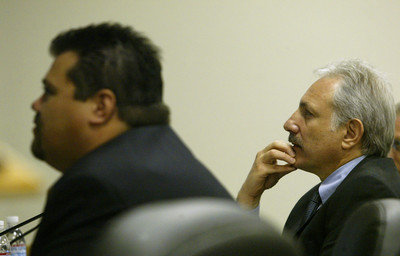Genetic tests find hepatitis C sources
Genetic testing has traced seven hepatitis C infections to two patients who underwent procedures at the Endoscopy Center of Southern Nevada last year, Southern Nevada Health District officials announced Thursday.
Brian Labus, health district senior epidemiologist, said one of the sources underwent a procedure July 25 and the other Sept. 21. The Sept. 21 patient was a known carrier of hepatitis C, meaning both the health care provider and patient knew the virus was in the patient's bloodstream at the time of the procedure.
It was unclear if the source from July 25 was a known carrier, Labus said at Thursday's meeting.
"We know when it started and where it went,'' Labus said, referring to the transmission of hepatitis C to seven former patients of the facility at 700 Shadow Lane on those two dates.
Six people have tested positive who underwent procedures there on Sept. 21. One tested positive after a July 25 visit. An eighth hepatitis C case has been linked to the clinic based on a procedure in 2005.
Health officials now will concentrate on determining how many more of the Shadow Lane facility's 50,000 patients may have been exposed during procedures between March 2004 and Jan. 11. That is the time frame in which health officials believe it was common practice among nurse anesthetists at the Shadow Lane facility to reuse single-dose vials of medication and syringes.
The number of acute hepatitis C cases linked to the clinic probably will remain at seven, unless the health district receives a report by the end of the month, Labus said.
Acute hepatitis C occurs when someone becomes ill within six months of exposure. July 11 marked the last date a former patient of the endoscopy center would have developed acute hepatitis C, based on a Jan. 11 exposure date.
"Within the next week or so, we should be done with getting acute cases,'' Labus said.
Chronic hepatitis C cases are a different story. In such cases, a patient won't become symptomatic within the incubation period, and the disease usually isn't identified until years after exposure.
Seven of the eight cases linked to the Shadow Lane facility are acute. The eighth case, which was announced on Wednesday, is a chronic case.
"This person had no symptoms,'' Labus said. "They wouldn't have known they had it unless they had been tested.''
The remaining case is linked to an affiliated clinic on Burnham Avenue.
Dr. Dipak Desai, a Las Vegas gastroenterologist, is majority owner of both clinics, which were closed shortly after the outbreak was announced.
County prosecutors will fold the new hepatitis case into the ongoing criminal investigation, Deputy District Attorney Scott Mitchell said.
The investigation was hindered by a wall of silence by the clinic's nurse anesthetists, who will be key witnesses in any prosecution, Mitchell said.
The lack of cooperation changed in recent weeks when prosecutors subpoenaed the nurses to testify before an investigative grand jury, he said.
"We have broken through that wall," Mitchell said, adding that some nurse anesthetists now are cooperating with investigators.
The grand jury also helped separate potential witnesses from potential defendants, allowing investigators to "whittle down the case against core people who we have good evidence against," he said.
The investigation will probably continue for a couple of months before any charges are filed, Mitchell said.
Desai and one of his partners, Dr. Eladio Carrera, have had their licenses suspended pending an investigation by the Nevada Board of Medical Examiners. The board has scheduled hearings for Desai and Carrera in September and October.
Both performed procedures at the Shadow Lane facility on July 25 and Sept. 21, dates when CDC and health district investigators believe nurse anesthetists contaminated single-dose anesthesia vials with syringes that were reused.
One nurse anesthetist told CDC investigators that the clinic's staff had instructed him to reuse syringes and single-dose vials of propofol, a fast-acting sedative.
Debra Scott, executive director of the Nevada State Board of Nursing, said 36 complaints have been filed against nurses affiliated with the endoscopy center.
Hearings have been scheduled for Oct. 22 and 23. However, Scott said, the regulatory board has not filed any charges against nurses.
She said complaints or charges brought by the nursing board can be filed 30 days in advance of the hearing.
"We have evidence at this point that there are witnesses willing to come forward saying some of the CRNAs used single-dose vials for more than one patient,'' she said.
The nursing board still needs some reports from law enforcement to complete its investigation, Scott said.
Six nurse anesthetists with ties to the Shadow Lane facility have voluntarily surrendered their licenses.
Health officials also announced Thursday that a hepatitis C registry launched by the health district last month is making progress. So far, 6,000 patients have responded to the registry.
The registry was launched in an effort to reach more of the clinic's population to identify those who may have been exposed.
During Thursday's meeting, Dr. Joe Hardy asked if any former patients of the Shadow Lane facility had tested positive for hepatitis B or HIV, the virus that leads to AIDS.
Labus said they had not.
"That would be called good news,'' Hardy said.
Review-Journal writer Brian Haynes contributed to this report. Contact reporter Annette Wells at awells@reviewjournal.com or 702-383-0283.


















